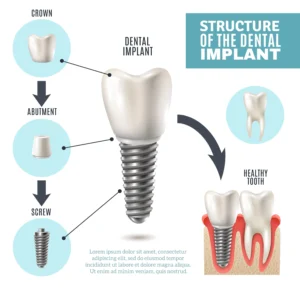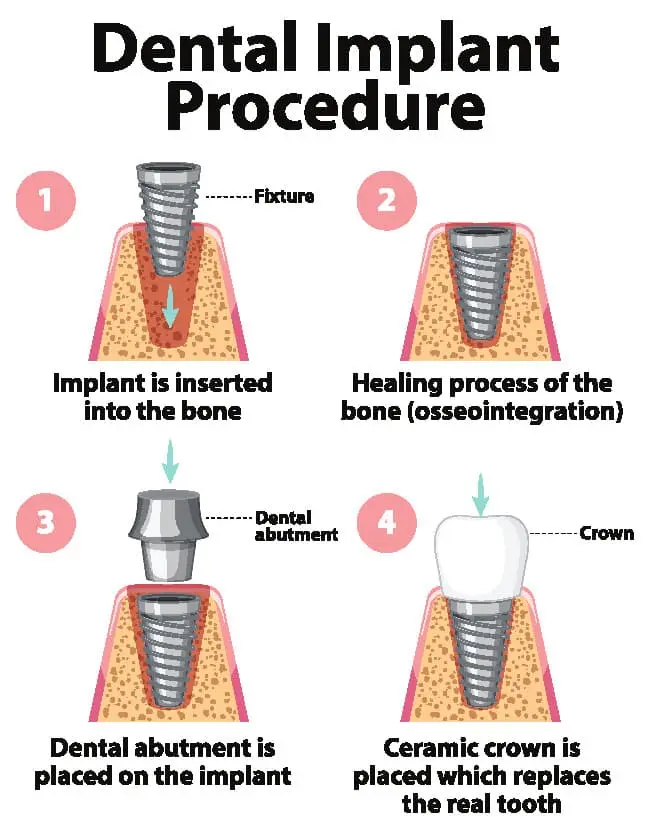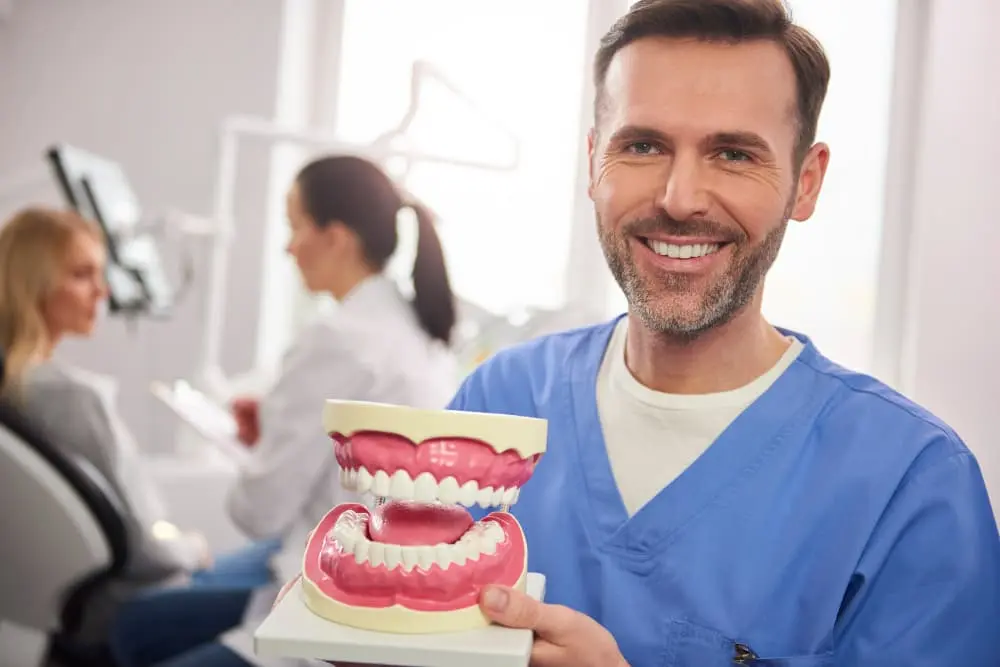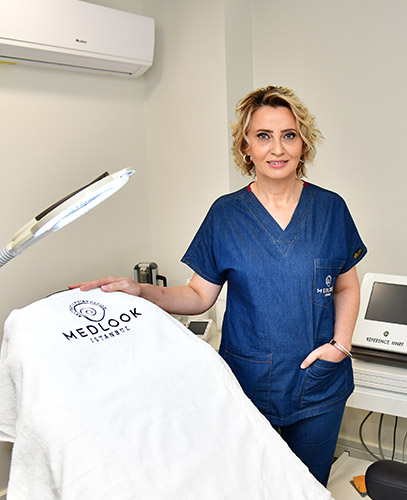
Our teeth play a crucial role not only in providing an aesthetic appearance but also in aiding our nutrition, speech, and overall health. Unfortunately, due to factors like aging, tooth decay, gum disease, or accidents, tooth loss can occur. Missing teeth can lead to difficulties in chewing, speech impairments, loss of confidence, and even bone loss in the jaw.
Fortunately, advancements in dentistry today offer effective and reliable solutions for replacing missing teeth. Dental implants and dentures are the most common tooth replacement options available. But which one is the best choice for you?
Why Should We Replace Missing Teeth?
Teeth are essential not only for a beautiful smile but also for chewing food, speaking clearly, and maintaining overall health. When we lose teeth, it goes beyond aesthetic concerns, affecting oral health and overall quality of life in several ways.
Common Causes of Tooth Loss
Several factors can lead to tooth loss. The most common causes include:
- Gum Disease: Conditions like gingivitis and periodontitis can damage the bone and tissues that support the teeth, ultimately leading to tooth loss.
- Tooth Decay: Tooth decay occurs when the enamel wears down and deteriorates. If left untreated, it can result in tooth loss.
- Injury: Sports injuries, falls, or accidents can cause teeth to break or be dislodged.
Other causes of tooth loss include poor oral hygiene, smoking, genetic factors, and certain systemic diseases.
The Impact of Missing Teeth on Health and Quality of Life
Losing teeth can lead to various issues, such as:
- Oral Health Problems: It may cause the remaining teeth to shift, bone loss in the jaw, and progression of gum diseases.
- Chewing Difficulties: Chewing food becomes challenging, potentially leading to digestive issues. Insufficient chewing can also weaken jaw muscles and cause problems with the jaw joint.
- Speech Impairments: Missing teeth can make it difficult to pronounce certain sounds, leading to speech issues.
- Loss of Confidence: It may result in hesitation to smile and discomfort in social settings.
To prevent these negative consequences, replacing missing teeth is crucial. Dental implants and dentures are effective and reliable options for this purpose.
Dental Implants: A Permanent Solution for Missing Teeth

Dental implants are small titanium screws placed into the jawbone to replace missing teeth. Titanium is a biocompatible material, meaning it integrates well with body tissues, allowing it to fuse with the jawbone and create an artificial tooth root. This process is called osseointegration.
A dental implant consists of three main components:
- Implant Screw: A titanium screw surgically placed into the jawbone, acting as an artificial tooth root.
- Abutment: A small connector placed on top of the implant screw to support the dental prosthesis.
- Dental Crown: An artificial tooth placed on the abutment, designed to mimic the look and function of a natural tooth.
The Implant Placement Process

Before the implant procedure, a detailed examination and planning phase is conducted by the dentist. The condition of the jawbone, health of the gums, and the patient’s overall health are evaluated.
Under local anesthesia, a small incision is made in the gum, and the implant screw is placed into the jawbone. The gum is then stitched up to allow for healing.
The implant screw is left to fuse with the jawbone over several months. During this period, the implant forms a strong bond with the surrounding tissues.
Once osseointegration is complete, the gum is reopened, and the abutment is attached to the implant screw.
Finally, the dental prosthesis (crown) is placed onto the abutment, completing the treatment.
Benefits
Dental implants offer numerous advantages for tooth replacement:
- Natural Look and Feel: Implants provide a look and sensation similar to natural teeth.
- Improved Chewing Ability: Since implants are securely anchored into the jawbone like natural teeth, you can comfortably chew food.
- Bone Preservation: Implants stimulate the jawbone, preventing bone loss and helping maintain the structure of the jaw.
- Durability: Implants are long-lasting and durable. With proper care, they can last a lifetime.
- Comfort: Implants are comfortable in the mouth, without the slipping or discomfort that can occur with dentures.
- Enhanced Oral Health: Implants do not negatively impact the health of other teeth and facilitate easier oral hygiene.
Dental implants provide a permanent, aesthetic, and functional solution for replacing missing teeth.
Dentures: A Removable Tooth Replacement Option

Dentures are removable appliances used to replace missing teeth. They are typically made of an acrylic or metal base with artificial teeth attached. Dentures help address the issues caused by tooth loss, such as difficulties in chewing, speaking, and aesthetics.
Types of Dentures
There are several denture options available, depending on the individual’s needs and the extent of tooth loss:
- Full Dentures: Used when all teeth are missing in the mouth. They can be made for the upper or lower jaw separately or for both. Full dentures are supported by the gums and jawbone.
- Partial Dentures: Designed for cases where some natural teeth remain. They are held in place with metal clasps or precision attachments that secure them to the existing teeth.
- Implant-Supported Dentures: These dentures are placed on top of dental implants. Implants provide added stability and support for the dentures. These can be either removable or fixed permanently onto the implants, also known as snap-on dentures.
Advantages and Disadvantages
While dentures offer some benefits for tooth replacement, they also come with a few downsides:
Advantages:
- Affordability: Dentures are generally more cost-effective than dental implants.
- Non-Surgical Procedure: Since they don’t require surgery, the recovery time is shorter.
- Quick Solution: Dentures can be fitted immediately after tooth loss, allowing patients to regain their teeth quickly.
Disadvantages:
- Discomfort: Dentures can initially cause discomfort in the mouth. They may also slip while eating or speaking, which can be bothersome.
- Bone Loss: Dentures do not stimulate the jawbone, leading to bone loss over time. This can cause the dentures to become loose, requiring adjustments or replacements.
- Maintenance: Dentures need regular cleaning and maintenance. Denture adhesives might also be necessary to keep them in place.
- Limited Chewing Ability: Dentures do not offer the same level of chewing efficiency as dental implants.
While dentures provide a cost-effective solution for tooth loss, they also come with certain limitations. It’s important to weigh these pros and cons when deciding between dental implants and dentures.
Dental Implants vs. Dentures: A Detailed Comparison
Dental implants and dentures are two of the most common methods used to replace missing teeth. Each option has its own advantages and disadvantages. To determine the best choice for you, let’s compare these two methods in detail.
Cost Comparison
- Implants: Generally more expensive than dentures. The cost depends on the number of implants, the material used, the complexity of the surgical procedure, and the dentist’s fees.
- Dentures: More affordable compared to implants. The cost varies based on the type of denture, materials used, and the dentist’s experience.
In the long run, implants may be more economical as they are longer-lasting and require less maintenance compared to dentures.
Durability and Longevity
- Implants: Offer a permanent solution by integrating with the jawbone. With proper care, they can last a lifetime.
- Dentures: As removable appliances, they may wear down or break over time. They typically need to be replaced every 5-10 years.
Implants are more durable and long-lasting compared to dentures. However, their success depends on the quality of the jawbone and the patient’s oral hygiene.
Comfort and Functionality
- Implants: Feel like natural teeth and allow for comfortable eating and speaking. They do not slip or cause discomfort.
- Dentures: Can initially cause discomfort in the mouth. They may also slip while eating or speaking. The fit and comfort of dentures depend on the dentist’s skill and the patient’s oral structure.
Implants provide greater comfort and functionality than dentures, offering a more natural feel and better chewing ability.
Maintenance and Cleaning
- Implants: Should be brushed and flossed like natural teeth. Regular dental check-ups are also important.
- Dentures: Must be removed and cleaned daily using denture cleaning tablets or solutions. Regular check-ups are necessary to monitor fit and condition.
Implants are easier to clean and maintain compared to dentures. However, maintaining good oral hygiene around implants is essential to keep the surrounding tissues healthy.
When choosing between dental implants and dentures, consider these factors and consult with your dentist to determine the best option for your needs.
Determining the Right Option for Your Needs
Dental implants and dentures both offer effective solutions for replacing missing teeth. However, each option comes with its own set of advantages and disadvantages. Choosing the best solution for you depends on a variety of factors.
Factors to Consider
By evaluating the following factors with your dentist, you can determine the most suitable tooth replacement option for you:
- Oral Health: If you have oral health issues such as gum disease or tooth decay, these may need to be treated before considering implant therapy.
- Bone Density: Implants require sufficient bone density in the jaw for placement. If your bone density is inadequate, a bone graft may be necessary before implant treatment.
- Budget: Implants are generally more expensive than dentures. Your budget will be a significant factor in deciding the right tooth replacement option.
- Lifestyle: Habits like smoking or teeth grinding can negatively affect the success of implants.
- Overall Health: Conditions like diabetes or heart disease may make implant treatment riskier.
The Importance of Consulting a Dentist
When choosing a tooth replacement option, consulting with a dentist is crucial. Your dentist will evaluate your oral health, identify your needs, and recommend the most suitable option to help you make an informed decision.
Remember, your dental health is essential for your overall well-being. Replacing missing teeth can help maintain your oral health, improve your chewing and speaking functions, and boost your confidence. Ensure you consult with a dentist to make the right choice and make an informed decision.
Conclusion: Make an Informed Decision for Your Smile
Replacing missing teeth is a crucial step for both your oral health and overall quality of life. Dental implants and dentures are two effective and reliable options available for this purpose.
In this guide, we’ve detailed the differences between implants and dentures, covering their advantages and disadvantages, along with important factors like cost, durability, comfort, and maintenance.
- Implants offer a permanent, natural-looking, and functional solution, while dentures present a more affordable and non-surgical option.
- The best choice for you depends on your oral health, bone density, budget, lifestyle, and personal preferences.
To make the right decision, it’s essential to consult with a dentist and receive a professional assessment. Your dentist will help determine the most suitable treatment option for you, guiding you toward achieving a healthy, confident smile.
Remember, your dental health is a crucial part of your overall well-being. Replacing missing teeth not only boosts your confidence but also improves your ability to chew and speak, contributing to a healthier, happier life.
Recent Posts
-
 Does Creatine Cause Hair Loss? Separating Fact from Fiction21 Jan 2025
Does Creatine Cause Hair Loss? Separating Fact from Fiction21 Jan 2025 -
 How Long Does Hair Transplant Last? A Comprehensive Guide to Long-Term Results15 Jan 2025
How Long Does Hair Transplant Last? A Comprehensive Guide to Long-Term Results15 Jan 2025 -
 Hair Loss After Hair Transplantation: Is It Normal and What to Do?13 Jan 2025
Hair Loss After Hair Transplantation: Is It Normal and What to Do?13 Jan 2025 -
 Donor Area in Hair Transplant: All You Need to Know - Istanbul Hair Institute06 Jan 2025
Donor Area in Hair Transplant: All You Need to Know - Istanbul Hair Institute06 Jan 2025 -
 The Connection Between Oral Health and Overall Health03 Jan 2025
The Connection Between Oral Health and Overall Health03 Jan 2025

